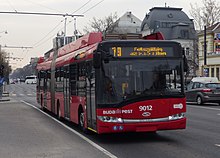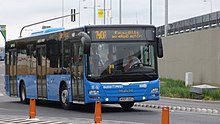BKV Zrt.




The BKV Zrt. (in short: BKV , written out: Budapesti Közlekedési Zártkörűen Működő Részvénytársaság ) is a transport company that handles most of the local public transport in the Hungarian capital Budapest .
vehicles
BKV, which belongs to the city of Budapest, operates a fleet of different modes of transport. These include four metro lines , 33 tram lines , 15 trolleybus lines and 271 bus lines , 40 of which are night lines . Until 2016, the company also operated the Budapesti Helyiérdekű Vasút (BHÉV) suburban railway .
The different means of transport are assigned individual identification colors, the trams are yellow, the trolley buses are red and the buses are blue. Only the metro cars are not uniform: the older Soviet metro cars on the M3 line are dark blue, while those on the M1 are painted yellow and those on the M2 and M4 are white.
As early as 1896, on the 1000th anniversary of the founding of the Hungarian state, the first subway in mainland Europe was inaugurated under the name “Földalatti”. The metro network is less developed, but is well complemented by the tram. In addition to the first line (now M1), there are two lines built with Soviet help (M2 and M3). A fourth line (M4) went into operation in 2014, it is handicapped accessible with elevators at all stations. The metro network is currently 38 kilometers long and has 48 stations.
Between March 2006 and May 2007, Siemens Transportation Systems delivered 40 low-floor trams of the Siemens Combino type . With a length of 54 meters, these cars are among the longest tram cars in the world. They run on line 4-6, which has the highest number of trams in the world. The nine-part CAF Urbos 3, which have been in use on Line 1 since 2016, are new record holders with a length of 56 meters. From the Üstra ( Hanover Stadtbahn ) BKV used rail cars that coming from the 1970s has type TW 6000 purchase.
At the end of 1887, an electric tram built by Siemens drove from the Westbahnhof to Király utca for the first time .
statistics
The share of public transport in Budapest's total traffic volume is currently around 55 percent. This value is declining: During the socialist era this proportion was 80 percent.
Finances
Since the fall of the iron curtain , the BKV has been suffering from a lack of money. The income from ticket sales does not even cover 50 percent of the costs. In 2004 and 2005, 100 low-floor buses from the manufacturer Volvo were leased in order to be able to carry out a rail replacement service for the M2 metro line, which urgently had to be modernized after 40 years of operation. It was also decided to buy new underground trains for the modernized M2 line and the M4 line, which was then under construction. According to the daily “ Magyar Nemzet ”, the debts of the BKV amounted to approx. 333 million euros at the beginning of 2010.
At the beginning of 2012, the BKV ran into enormous financial problems. In January all the spare parts in the warehouse were used up. According to media reports, the theft of 20 meters of power line cables is enough to cease operations on the entire affected line, as one is unable to replace the stolen cables and shut down the network.
Tickets
A single ticket (Vonaljegy) is valid for 60 minutes from its validation. When changing, another ticket must be validated, except when changing between the metro lines, if you do not leave the inner station area. There is a short-distance ticket (Metrószakaszjegy) for short trips on the metro up to a maximum of three stations and a maximum of 30 minutes.
A transfer ticket (Átszállójegy) entitles you to a single transfer with an extended period of validity. This ticket must be validated both at the start of the journey and when changing trains. Both ends of the ticket are marked accordingly. As with the single ticket, direct transfers between the metro lines are free.
Network cards with a validity of 24 and 72 hours are available for tourists. For groups of up to five people there is a 24-hour group ticket (Budapest csoportos 24 órás jegy).
People aged 65 and over are allowed to use all public transport in second class throughout Hungary free of charge.
Scandal 2009
At the end of 2009 and beginning of 2010, the former deputy chairman of the BKV and several former senior managers were arrested on the basis of investigations into fraud, illegal continued payment of wages, excessive and unjustified severance payments, bogus consulting contracts and mafia business agreements.
In the media
The film Kontroll was shot in the metro tunnels of the M2 and M3 lines between 2002 and 2003 . He won several awards. During the ironic opening credits of the film, the former boss of the BKV explains personally that all actions and people in the film are absolutely fictional.
Web links
- Official website (Hungarian, English and German)
- Unofficial site about the Budapest tram (Hungarian and English)
- Tram trips: Budapesti Közlekedési Vállalat (BKV)
Individual evidence
- ^ Pester Lloyd: Deficit on Wheels ( Memento from May 15, 2012 in the Internet Archive ). Budapest, February 3, 2010.
- ^ Pester Lloyd: "Time to go ..." ( Memento of July 7, 2010 in the Internet Archive ) Budapest, February 12, 2010
- ^ Pester Lloyd: "BKV Affair: Withdrawal and House Arrest in Budapest" ( Memento of July 7, 2010 in the Internet Archive ). Budapest, February 2, 2010.